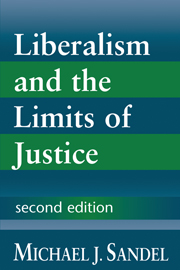Book contents
- Frontmatter
- Contents
- Preface to the Second Edition: The Limits of Communitarianism
- Acknowledgments
- Introduction: Liberalism and the Primacy of Justice
- 1 Justice and the Moral Subject
- 2 Possession, Desert, and Distributive Justice
- 3 Contract Theory and Justification
- 4 Justice and the Good
- Conclusion: Liberalism and the Limits of Justice
- A Response to Rawls' Political Liberalism
- Bibliography
- Index
A Response to Rawls' Political Liberalism
Published online by Cambridge University Press: 05 June 2012
- Frontmatter
- Contents
- Preface to the Second Edition: The Limits of Communitarianism
- Acknowledgments
- Introduction: Liberalism and the Primacy of Justice
- 1 Justice and the Moral Subject
- 2 Possession, Desert, and Distributive Justice
- 3 Contract Theory and Justification
- 4 Justice and the Good
- Conclusion: Liberalism and the Limits of Justice
- A Response to Rawls' Political Liberalism
- Bibliography
- Index
Summary
In this new closing chapter, I reply to the revised version of liberalism that John Rawls presents in Political Liberalism. Before doing so, however, I would like to set Rawls' recent book in context by describing the different strands of argument his remarkable work has inspired.
It is a measure of its greatness that Rawls' earlier work A Theory of Justice provoked not one debate but three. The first, by now a starting point for students of moral and political philosophy, is the argument between utilitarians and rights-oriented liberals. Should justice be founded on utility, as Jeremy Bentham and John Stuart Mill argue, or does respect for individual rights require a basis for justice independent of utilitarian considerations, as Kant and Rawls maintain? Before Rawls wrote, utilitarianism was the dominant view within Anglo-American moral and political philosophy. Since A Theory of Justice, rights-oriented liberalism has come to predominate.
The second debate inspired by Rawls' work is an argument within the terms of rights-oriented liberalism. If certain individual rights are so important that even considerations of the general welfare cannot override them, it remains to ask what rights these are. Libertarian liberals such as Robert Nozick and Friedrich Hayek argue that government should respect basic civil and political liberties, and also the right to the fruits of our labor as conferred by the market economy; redistributive policies that tax the rich to help the poor thus violate our rights.
- Type
- Chapter
- Information
- Liberalism and the Limits of Justice , pp. 184 - 218Publisher: Cambridge University PressPrint publication year: 1998
- 7
- Cited by



